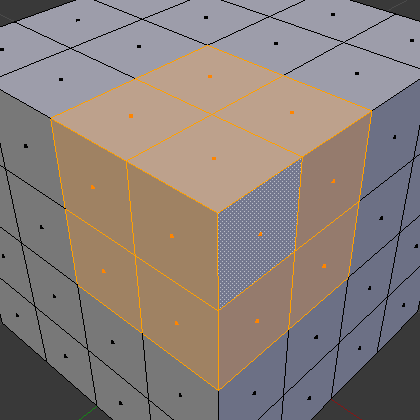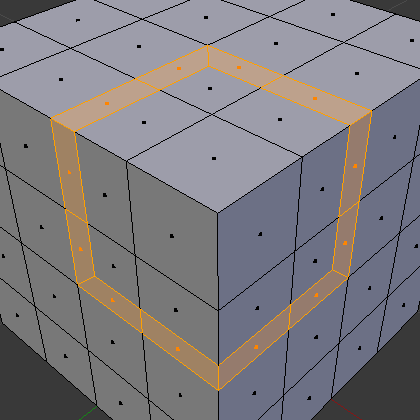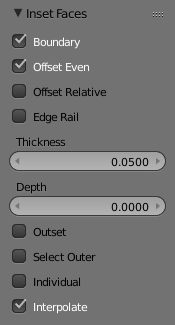Cắt Nội Bề Mặt (Inset Faces)
Tham Chiếu (Reference)
- Chế Độ (Mode)
Chế Độ Biên Soạn (Edit Mode)
- Công Cụ (Tool)
- Trình Đơn (Menu)
- Tổ Hợp Phím Tắt (Shortcut)
I
This tool takes the currently selected faces and creates an inset of them, with adjustable thickness and depth. Think of it as like creating an edge loop, but relative to the selected edges, even in complex meshes.
The tool is modal, such that when you activate it, you may adjust the thickness with your mouse position. You may also adjust the depth of the inset during the modal operation by holding Ctrl.

Lựa chọn thành cắt nội. |

Lựa chọn với cắt nội. |
Tùy Chọn (Options)

Các tùy chọn về thao tác cắt nội.
- Ranh Giới (Boundary B)
Determines whether open edges will be inset or not.
- Dịch Chuyển Đều (Offset Even)
Scale the offset to give a more even thickness.
- Dịch Chuyển Tương Đối (Offset Relative)
Scale the offset by lengths of surrounding geometry.
- Bám theo Cạnh (Edge Rail)
Created vertices slide along the original edges of the inner geometry, instead of the normals.
- Độ Dày (Thickness)
Set the size of the offset.
- Độ Sâu Ctrl (Depth Ctrl)
Raise or lower the newly inset faces to add depth.
- Cắt Ngoại O (Outset O)
Create an outset rather than an inset. Causes the geometry to be created surrounding selection (instead of within).
- Chọn Ngoài (Select Outer)
Toggle which side of the inset is selected after the operation.
- Từng Cá Nhân Một I (Individual I)
By default the Inset tool operates on the region around selected faces, but with this option each selected face can be inset on its own.
- Nội Suy (Interpolate)
Interpolate mesh data: e.g. UVs, Color Attribute's colors, weights, etc.